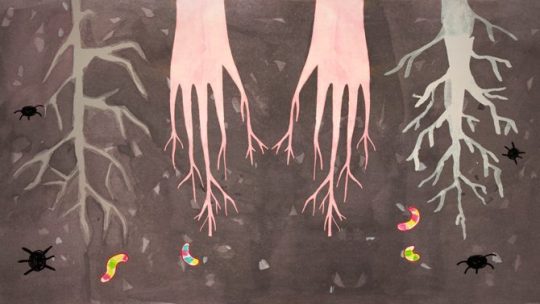#Kistschies
Text
Evolutionary Fists

i side with conscious evolution
over endless revolutions
and the results are
mixed,
i grabbed that flashin’
bolt over future
moot revolts–
tho, can’t say i never
get the urge to
form a fist,
just to bump my hi
to neighbor–
not for bashin’ thru
their bricks.

image: https://www.flickr.com/photos/olga_fedoseeva/93379400…
View On WordPress
#abstract poetry#collective good#coloursofthesoul#creative living#evolution of consciousness#evolution vs revolution#fists of cotton#fourth density living#golden age#inspirational#kill em with a feather#kistschy#mindfulness#resilience#rhyme#spirituality#vulnerability
0 notes
Text
Blackwell’s review: Record of a Spaceborn Few – Becky Chambers
This review was written by Blackwell’s Bookseller Eris Young at Blackwell’s Edinburgh
Record of a Spaceborn Few is the latest (but not the last!) in Becky Chambers’ Wayfarers series. It follows a handful of humans as they struggle with questions of mortality, community, relationships, home and life beyond the horizons of what we call home.
The lives of the characters interweave loosely in this one, and only touch on the events of the previous two novels, such that initially I found myself hoping characters from the previous books would show up in this new context. But it wasn’t long until I fell in love with the new characters as well: as multilayered, flawed and vulnerable as any of Chambers’ protagonists.
The story, too, takes place largely on a single space station – a tiny geographic area considering the previous two books literally spanned planets. And it’s this limited scale that ironically brings brings home just how expansive and intricate the world of Wayfarers really is. As loosely as the stories told in this book lace into the previous ones, this is unequivocally a Wayfarers novel: it’s told in Chambers’ earnest, “up-lit” style storytelling that is uplifting but never saccharine, and the scale of the story feels utterly organic.
This scale was one of my favourite things about the book. Rather than culminate in a giant dramatic space gunfight, as is the wont of so many books these days, the conclusion to Record of a Spaceborn Few is much more introspective. The biggest, most violent event in the book occurs in the prologue, and sets in motion expanding ripples of internal development for each of the point of view characters. The individual plot arcs are all internal, and the conflicts grow out of what the characters themselves find important and difficult: human connection, community, home, individual fears rooted in past trauma.
This may be a different kind of storytelling than today’s readers are used to, recalling the stories of Ursula le Guin more than, say, Star Wars or Star Trek, but it is, I think, a necessary one. So often the sci fi stories we are told are so wrapped up in large-scale conflicts, wars, ecological disasters, planetary destruction, and so obsessed with glorifying imaginative technology and flashy effects, that we lose sight of the human struggle, the everyday detail and collateral damage of the progress humanity has made in these tales. But these stories, for me, are the more interesting ones.
Record of a Spaceborn Few tells a small story rooted indelibly in a larger world and a collective invented history spanning generations. Chambers once again proves herself a keen student of language and culture, deftly and tenderly portraying the complex and often fraught relationships between her characters, in a book that left me feeling deeply contemplative and ultimately hopeful.
from http://bit.ly/2KvWsWE
0 notes
Text
Reflections on judging the Kitschies 2014
We read 198 books for The Kitschies in 2014 – lots of data on the breakdown here – and I’ve got a LOT of thoughts, and at least some appeals to publishers.
Doing this is a labour of love: Yes, you get free books, and free books are always good, but it will stress your love and abilities as a reader, adjust your faith in humanity, and reward you with hidden gems and big, great art. There are times when you’ll despair at the mountain of books – and, when you’ve given up a weekend power-read through a dozen books which all turn out to be not for you, not for the award, poorly written, poorly edited, you’ll droop your head in shame and think “They’re right, all the naysayers saying that everything is getting worse.
Then you’ll pick up a book and it’s like slipping into a natural hot spring on a much-deserved holiday after a crazy set of months at work.
I found as well that, despite me having more books than I can possibly use, that I still want them all. That frisson of excitement when you go into a bookstore? Still there.
Still, there are some things I’d beg of publishers.
Publishers – send in your books early
We opened in June, and we had maybe a dozen books in in the first few heady months, keeping well on top of the lists; it wasn’t until around October that they started piling in and we starting experiencing the Fear of Words on the Page. I know you’re busy, but you spend 6-18 months working on a book, helping it through agents and writer’s fears – give it time to breathe. Send in a few packages of books across a few months. Give us lots of time to read and reflect on them.
Consider the award’s history before sending things in
198 books sounds like a lot – and it is. No one would mind, but actually many of the books just aren’t appropriate.
Progressive, intelligent, and entertaining is a broad brief, but it is a brief.
A shortlist is more of a reflection of a prize than an award win
Judging books is hard – we never pick the “best”, but something that’s emblematic of progressive, intelligent and entertaining. Which is lucky. The Guardian did a series of interviews with Booker prize juries, and it makes for enlightening reading. I think, if you want to understand a prize – not least The Kitschies – looking at the shortlist is a better indication, but it makes less interesting reading to say “we gave 5 books £200 each” than “THIS BOOK IS THE PROGRESSIVEST ENTERTENTACLIST AND INTELLIGENTER ONE OF THEM ALL and here’s £1,000 to prove it”.
No prize gets everything
We call books in (i.e. we email the publishers and beg them to send them in), but we don’t get everything. Some publishers don’t send them out. Sometimes a memo (we assume) gets lost inside a publisher, so they mean to but don’t. Some books we miss due to the onslaught of books breaking Posties’ backs starting in November. We might have missed your favourites. Don’t take it out on the judges.
It’s way, super fun
I’ve been personally honoured to read a shed-ton of books – many of which were really brilliant and couldn’t be on the shortlists due to size – and to work with the clever and intelligent Kim Curran, Frances Hardinge, Adam Roberts, and Cat Webb, who are all lovely, hard-working delightful people, who will drink wine from tupperware and bring Cthullhu cakes and cheese along. It’s a joy and a delight and something that you should really do if you ever get the chance.
from http://ift.tt/1FW1ePV
0 notes